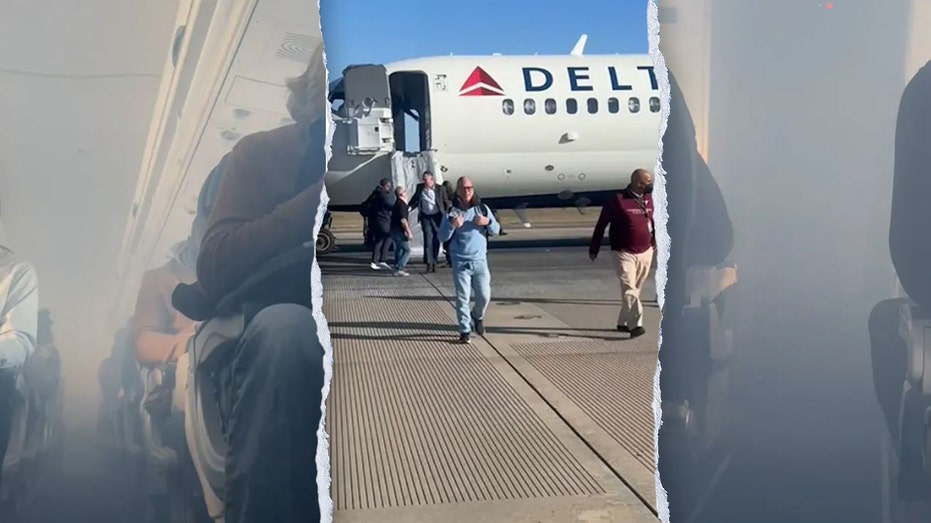Imagine settling into your seat, ready for a routine flight from Atlanta to Columbia, South Carolina. Suddenly, a mysterious haze fills the cabin, turning your journey into an unexpected adventure. This was the reality for passengers on Delta Air Lines Flight 876 on a Monday morning, forcing the plane to make a swift return to Hartsfield-Jackson Atlanta International Airport.
The Delta Flight 876 Incident: A Sudden Haze
At around 8:30 a.m., Delta Flight 876 took off from Atlanta, carrying 94 passengers and five crew members. Just half an hour into the flight, the crew noticed a “haze” filling the cabin. The Federal Aviation Administration (FAA) reported that the crew also detected possible smoke in the flight deck, prompting an immediate response.
Quick Action by the Crew
The flight crew, trained for such emergencies, followed established procedures to safely return to Atlanta. Delta emphasized the importance of safety, stating, “Nothing is more important than the safety of our customers and people, and we apologize to our customers for the experience.”
Landing and Evacuation
At approximately 9 a.m., Flight 876 landed safely back at Hartsfield-Jackson Atlanta International Airport. Video footage from inside the aircraft captured the tense moments as the cabin filled with what appeared to be smoke. Upon landing, passengers used emergency slides and exits above the wings to evacuate the plane quickly and efficiently.
Passenger Experience and Response
Passengers, initially startled by the unexpected turn of events, praised the crew’s professionalism and quick thinking. One passenger remarked, “It was scary, but the crew handled it perfectly. We felt safe even in the chaos.”
Delta’s Response and Support
Delta Air Lines immediately took action to support the affected passengers. The airline arranged ground transportation and rebooking for those whose travel plans were disrupted. Delta also expressed their commitment to investigating the cause of the haze to prevent future occurrences.
Investigation and Future Safety
The FAA has launched an investigation into the incident to determine the source of the haze and to ensure that all safety protocols were followed. Delta’s cooperation with the investigation underscores their dedication to passenger safety.
Recent Aviation Incidents
The incident with Delta Flight 876 is part of a series of recent aviation events that have heightened concerns about air travel safety. Just days before, an American Airlines flight from New York to New Delhi was diverted due to a “security concern,” escorted by Italian fighter jets. The specific cause of the security concern was not disclosed.
Other Notable Incidents
Earlier in the month, another Delta flight experienced a dramatic incident when it burst into flames and flipped upside down while landing at Toronto Pearson Airport. Thankfully, all passengers and crew survived, though some were injured.
Additionally, a tragic midair collision occurred over a regional airport in Arizona between a Cessna and a Lancair aircraft, resulting in fatalities. Less than 48 hours later, a medical ambulance flight crashed in Philadelphia, claiming seven lives.
The Importance of Safety Protocols
These incidents highlight the critical role of safety protocols in aviation. The swift response of the Delta Flight 876 crew exemplifies how training and preparedness can mitigate risks and ensure passenger safety.
Training and Preparedness
Airline crews undergo rigorous training to handle a variety of emergency scenarios. This training includes:
- Evacuation procedures
- Fire suppression techniques
- Communication with air traffic control during emergencies
- Passenger management and reassurance
The effectiveness of this training was evident in the safe landing and evacuation of Delta Flight 876.
The Role of Technology in Aviation Safety
Modern aircraft are equipped with advanced technology designed to enhance safety. These technologies include:
- Smoke detection systems
- Fire suppression systems
- Emergency communication systems
- Advanced navigation and autopilot systems
The Boeing 717 involved in the Delta Flight 876 incident likely utilized these systems to help the crew manage the situation effectively.
Passenger Rights and Airline Responsibilities
When incidents like the one on Delta Flight 876 occur, passengers have certain rights, and airlines have responsibilities to ensure their well-being. These include:
- Providing timely information about the incident
- Arranging alternative travel options
- Offering compensation for delays or cancellations
- Ensuring passenger safety and comfort during and after the incident
Delta’s quick response in arranging ground transportation and rebooking flights demonstrates their commitment to these responsibilities.
Lessons Learned and Moving Forward
The incident with Delta Flight 876 serves as a reminder of the unpredictable nature of air travel and the importance of preparedness. While such events are rare, they underscore the need for continuous improvement in safety measures and protocols.
Continuous Improvement
Airlines and regulatory bodies must work together to:
- Analyze incidents to identify areas for improvement
- Update training programs to reflect new safety technologies and procedures
- Enhance communication between crew members and passengers during emergencies
- Implement advanced safety technologies across fleets
By doing so, they can further minimize risks and ensure that passengers feel safe and confident in their travel experiences.
Conclusion: A Testament to Safety
The story of Delta Flight 876 is a testament to the effectiveness of safety protocols and the dedication of airline crews to passenger safety. Despite the initial shock and fear, the incident ended with all passengers and crew safely on the ground, thanks to the quick thinking and training of the Delta team.
As we move forward, the aviation industry must continue to prioritize safety, learn from incidents, and implement improvements to ensure that every flight is as safe as possible. The passengers of Delta Flight 876 can rest assured that their safety was the top priority, and their experience will contribute to making air travel even safer for everyone.
Source: www.foxnews.com
